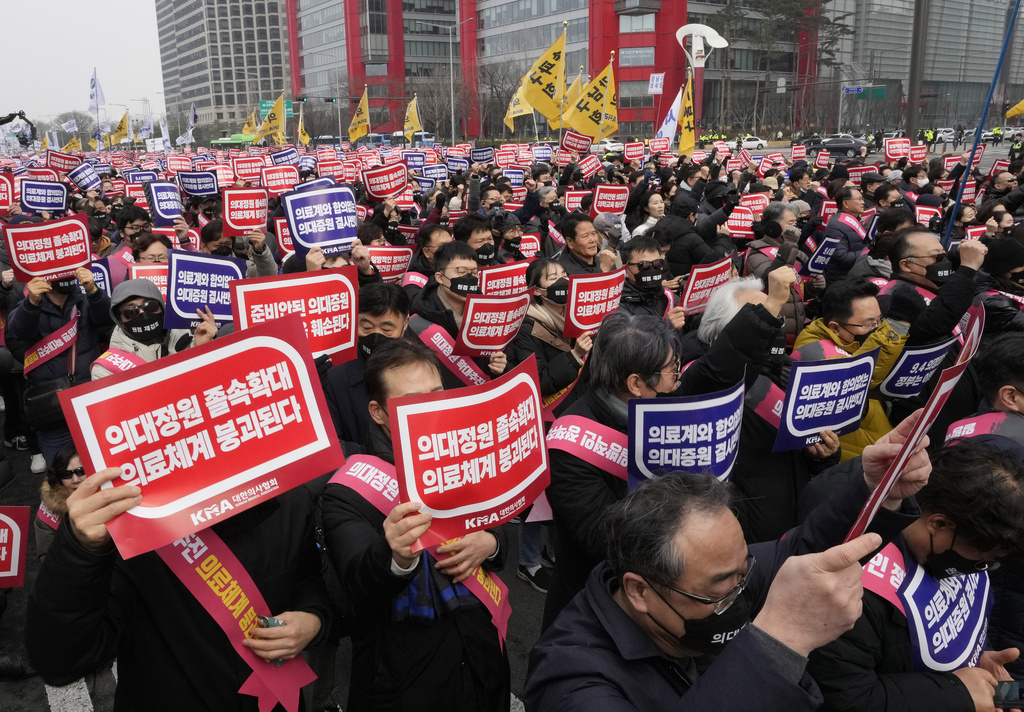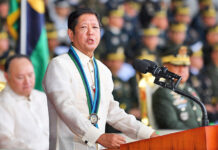SEOUL (AFP) – South Korea has suspended the medical licences of two doctors, the Korean Medical Association said Tuesday, in the first punitive action over a month-long strike that has caused healthcare chaos.
Thousands of junior doctors stopped working February 20 to protest government reforms aimed at creating more medics to end shortages and deal with a rapidly ageing population, forcing hospitals to cancel crucial treatments and surgeries including chemotherapy and C-sections.
The government has repeatedly urged doctors to return to their patients, warning of legal action for non-compliance, but the standoff has spiralled, with senior doctors now threatening to join their junior colleagues and no serious talks underway.

Two officials from the Korean Medical Association, which has been heavily involved in the walkout, were informed Monday that their licenses had been suspended for three months, purportedly for instigating the strike.
“The two officials, Kim Taek-woo and Park Myung-ha, received the notice yesterday,” spokesperson Lee Seok-young told AFP.
A health ministry spokesperson told AFP that the government would not provide confirmation regarding the specific administrative actions taken against individual physicians.
The KMA has previously accused the government of using “intimidation tactics” to try to force doctors back to work, and said it was turning the country into a “totalitarian state”.
Under South Korean law, doctors are restricted from striking, and the government has requested police investigate people connected to the stoppage, including officials at the KMA.
“The government deeply regrets the current situation where even professors are considering resigning following the footsteps of trainees,” second Vice Health Minister Park Min-soo told reporters told reporters Tuesday.
“Once again, the government is willing to talk to the medical community at any time without conditions,” he said, although Seoul has emphasised that abandoning the reform plan is not an option.
Seoul is pushing to admit 2,000 more students to medical schools annually from next year to address what it says is one of the lowest doctor-to-population ratios among developed nations.
Doctors say they fear the reform will erode the quality of service and medical education, but proponents of the plan accuse them of trying to safeguard their salaries and social status.
President Yoon Suk Yeol on Tuesday said the reforms were necessary, and lamented the fierce opposition from physicians.
“Medical licenses granted to save the lives of the people should not be used as a means of threatening and destabilising the people,” Yoon said.
The reforms will “strengthen essential medical care in the (non-capital) regions,” he added.
Experts say that one of the South Korean medical system’s biggest problems is that many doctors are concentrated in the Seoul metropolitan area leading to access issues in rural areas.
Last week, the junior doctors said they had submitted a “letter requesting emergency intervention” from the International Labour Organization (ILO), claiming they were being “forced” by the government into unwanted labour. The government has dismissed the claim.
The reform plan enjoys broad public support, but a new poll by local media found 34 per cent of people wanted the government to negotiate to end the standoff.



















































